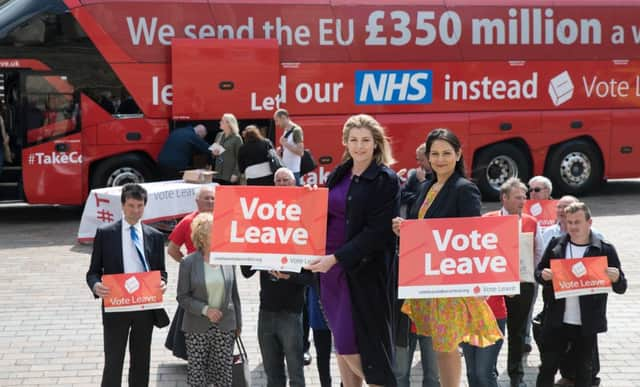Joyce McMillan: Brexiters unprepared for their victory


For myself, I’ve never been very convinced that the idea of a “post-truth” culture would survive any real crisis in our society by more than five minutes; when people are dying, when food runs out or tsunamis strike, people are generally too busy trying to get reliable information, and act on it, to indulge in debates about whether facts really exist any more. Yet among the overwhelmingly pro-Remain crowd who assemble for the Edinburgh Festival, there’s a persistent feeling that something unprecedented happened to British politics during the EU referendum campaign; that where politicians often talk about “a victory for common sense”, what happened on 23 June was exactly the opposite, a victory for obvious nonsense and some outright lies, vocally supported by global leaders in reactionary bombast like Vladimir Putin and Donald Trump, that has moved us into a whole new world of political incoherence and uncertainty.
To say so, of course, is not to imply that the Remain campaign in the same referendum was not guilty of the usual political vices of exaggeration, scare-mongering and arrogance. It’s difficult, though, to recall any victorious political campaign in British history which has delivered such a chaotic and vacuous response to its own success as the UK Leave campaign. During the “meltdown weekend” after their unexpected victory, Boris Johnson disappeared to the shires and wrote a ridiculous newspaper column, Nigel Farage resigned the Ukip leadership, and Michael Gove stabbed Johnson so fiercely in the back that his entire party gave up on him. A week or two later, the new Prime Minister Theresa May chose to rescue three leading Leave supporters by putting them in charge of key Brexit departments; but so far, they have done little but bicker about who is responsible for exactly what.
Advertisement
Hide AdAdvertisement
Hide AdThen last week, reports emerged that the government is not remotely ready to begin trade negotiations with the EU, never mind 120 other countries worldwide, and may not be ready for another year. Theresa May, now on holiday in Switzerland, seems openly reluctant to activate the famous Article 50 at all; no-one in government seems to have the slightest idea what to do about the threat of a new border in Ireland, or about how to preserve the vital Belfast/Good Friday Agreement of 1998 after Brexit. And meanwhile, politicians like the leading Brexit campaigner Gisela Stewart are joining Nicola Sturgeon in demanding that the rights of EU citizens living in the UK should be guaranteed as an act of basic humanity, rather than held as a bargaining-chip for future negotiations; anyone might think that Mrs Stewart, apparently one of the more sensible Brexit leaders, had not fully thought through the implications of the radical constitutional change for which she campaigned so vigorously, earlier this year.
All of which suggests that somewhere between the Scottish independence referendum of 2014, and this year’s EU vote, we did indeed step through some kind of looking-glass, into a world of noisy political argument unmoored from any sense of responsibility or consequence. The Scottish referendum was essentially a battle between two elected governments – at Westminster and Holyrood – both of which felt some responsibility for trying to prepare for the outcome, should they be successful; the SNP’s Scotland’s Future white paper of November 2013, while often severely criticised, at least provided a substantial government document as a basis for debate, and helped to inspire some exciting forward thinking about what a future Scotland might achieve.
The forces that formed a rough Brexit alliance during the EU referendum, though, had no such institutional base, and no such sense of responsibility. It’s possible, of course, to lay considerable blame at David Cameron’s door; he made no preparations for Brexit because he believed, and lazily assumed, that a Leave vote was unthinkable.
In the end, though, the UK was plunged into this new phase of its history primarily by two forces; by the loud bunch of nostalgists and opportunists who led the Leave campaign, and by the frightening willingness of millions of British voters to take these evidently hollow men at their word. Which means that now, there are only two really important questions arising from these strange events. The first is how to limit the damage done by this decision, both to the UK and its economy, and to the whole structure of stability in Europe; if the mood in Edinburgh this month is any guide, the arts and cultural sector, at least, will be bending every sinew to ensure that Brexit means, if anything, a stepping-up of human and cultural dialogue across the continent, at a time when politics will be seeking to raise new barriers among us.
And the second is to try to work out what kind of reality check might bring that slender majority of British voters back from the looking-glass world where Boris Johnson and Nigel Farage are friends of the people, MEPs in Brussels are the enemy, and Brexit immediately unleashes £350 million a week of extra spending for the NHS. Artists, of course, are great lovers of fiction, and of a fine fantasy narrative. It’s one of the paradoxes of art, though, that at its best, it uses imagination and fiction as a way of reaching towards the truth; and not as a confection of lies designed to lead people ever further into confusion, and into torpedoing their children’s future for the brief pleasure of wiping the smile off the face of a prime minister who – in a fitting conclusion to this tale of political dereliction – turned out to be gone from office before morning, humming a little tune as he went.